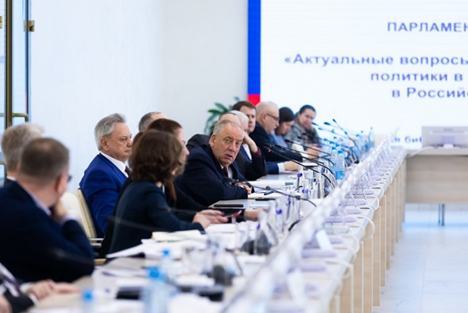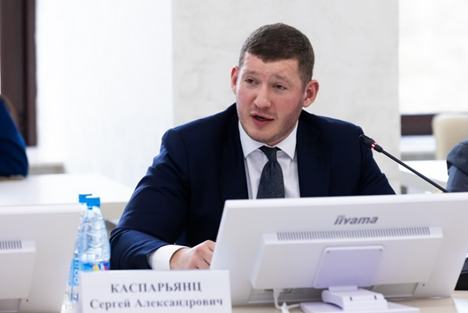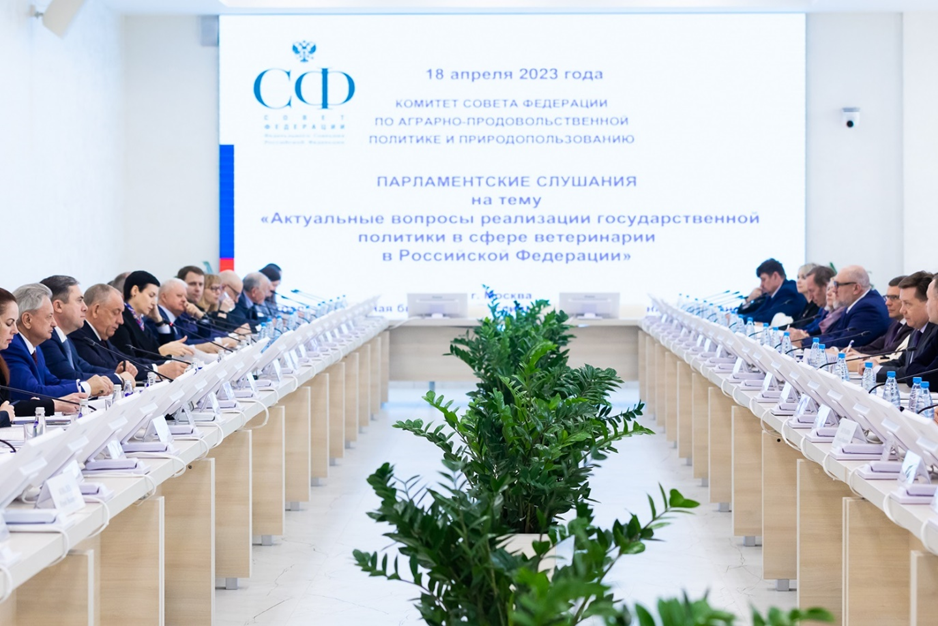VIC Group: 3 Government support actions to address the import dependency of veterinary medicines within 3 years
Sergey Mitin, First Deputy Chairman of the Federation Council Committee on Agrarian and Food Policy and Environmental Management, held parliamentary hearings on "Topical Issues of State Policy Implementation in the Veterinary Sphere" in Moscow on April 18. The event was attended by Maxim Uvaidov, State Secretary, Deputy Minister of Agriculture of the Russian Federation, Maria Novikova, Director of the Veterinary Department of the Russian Ministry of Agriculture, representatives of regional state agencies, academic and expert communities, including VIC Group as the largest manufacturer of veterinary drugs in Russia.
 In his welcoming speech, Sergey Mitin emphasized that the Federation Council systematically gives attention to the development of the Russian veterinary industry - both by parliamentary control and by legislation. "In today's world, the veterinary industry is one of the major security factors for the country. The efficiency of production and processing of livestock products directly depends on the epizootic well-being of the regions and, ultimately, the implementation of the Russian Federation Food Security Doctrine," the parliamentarian said.
In his welcoming speech, Sergey Mitin emphasized that the Federation Council systematically gives attention to the development of the Russian veterinary industry - both by parliamentary control and by legislation. "In today's world, the veterinary industry is one of the major security factors for the country. The efficiency of production and processing of livestock products directly depends on the epizootic well-being of the regions and, ultimately, the implementation of the Russian Federation Food Security Doctrine," the parliamentarian said.
Timur Chibilyaev, Executive Director of the National Veterinary Association (NVA), reported the production volume of all veterinary pharmaceuticals in 2022 at 63.7 billion rubles. The share of Russian producers amounts to 44%, and it can be significantly increased. Generally speaking, the share of local manufacturers on the Russian pharmaceutical market is 36%.
Sergey Kaspariants, Executive Director of VIC Group, highlighted that the results achieved by Russian producers in the veterinary market are outstanding: until 2022, the industry had no support; their achievements are the result of their own independent efforts, and in a very competitive environment. In Russia alone, all the global players from the US, Europe and Asia are in place, as well as regional companies from the Middle East, Eastern Europe, and Africa, with more than 200 companies from Belarus and from our country. In the course of fierce competition, a very efficient market has developed, but the current geopolitical challenges pose serious risks.
The NVA reports that antibiotics are in the most advantageous position in terms of import substitution - more than 52% of the manufactured drugs are Russian. Domestically produced vaccines occupy slightly more than 1/3 of the market and about 3 billion of them are produced under government tenders, and a large share is exported. Antiparasitic drugs, coccidiostatics and hormones account for about 1/5 of the market.
Head of VIC Group cited data on achieving import independence, based on 4 recent years' statistics: "If the industry continues to develop at the same pace, the purely mathematical trend suggests that import independence for antibacterials will be achieved by 2028, for vaccines by 2032, hormones by 2040, coccidiostatics by 2113, for antiparasitic drugs - probably never".
 However, the capacities of Russian producers not only on the domestic market, but also on the global markets are very high. "VIC Group is among the top 25 largest veterinary companies in the world and supplies its products to more than 50 countries. We know for a fact that they are in demand on international markets due to the highly competitive Russian market. Only 12 companies produce 88% of all veterinary drugs in Russia, and they will be just as effective abroad. By 2030, export potential could reach 30 billion rubles," Sergey Kaspariants explained.
However, the capacities of Russian producers not only on the domestic market, but also on the global markets are very high. "VIC Group is among the top 25 largest veterinary companies in the world and supplies its products to more than 50 countries. We know for a fact that they are in demand on international markets due to the highly competitive Russian market. Only 12 companies produce 88% of all veterinary drugs in Russia, and they will be just as effective abroad. By 2030, export potential could reach 30 billion rubles," Sergey Kaspariants explained.
Sergey Mitin pointed out that in order to use the domestic business capacity effectively, the government should specify the import substitution areas and apply various measures of state support for development and exports.
Currently existing measures of state support - a simplified registration of drugs for import substitution, which provided the opportunity to release dozens of new products on the market, as well as the official assignment of the veterinary industry in March this year with the OKPD2 codes (codes of All-Russian classifier of products by type of business).
Sergey Kaspariants proposed to introduce 3 major factors to support producers that would guarantee the achievement of their import independence commitments within 2 to 3 years:
1. Include member companies of the National Veterinary Association, Vetbioprom, and FGBI «ARRIAH» in the list of systemically important companies.
2. Develop mechanisms to facilitate the commissioning of new production sites for such companies.
3. Develop policies to speed up the introduction of new veterinary medicines.
Introducing these measures would ensure enough flexibility and freedom for end users, maintaining a guaranteed level of product safety and efficiency, expanding the range of products, and would not require funding from the Ministry of Agriculture and the industry.
Maria Novikova, Director of the Veterinary Department of the Russian Ministry of Agriculture, advised that the necessary measures of state support are being developed together with the Ministry of Industry and Trade, in particular, the Federal Research and Technical Program on compensation for drug development costs and the list of such costs.
Following the parliamentary hearings a draft working document on Federation Council regulations will be drawn up and sent to all executive agencies, concerned subjects of the Russian Federation and the Government of the Russian Federation.

